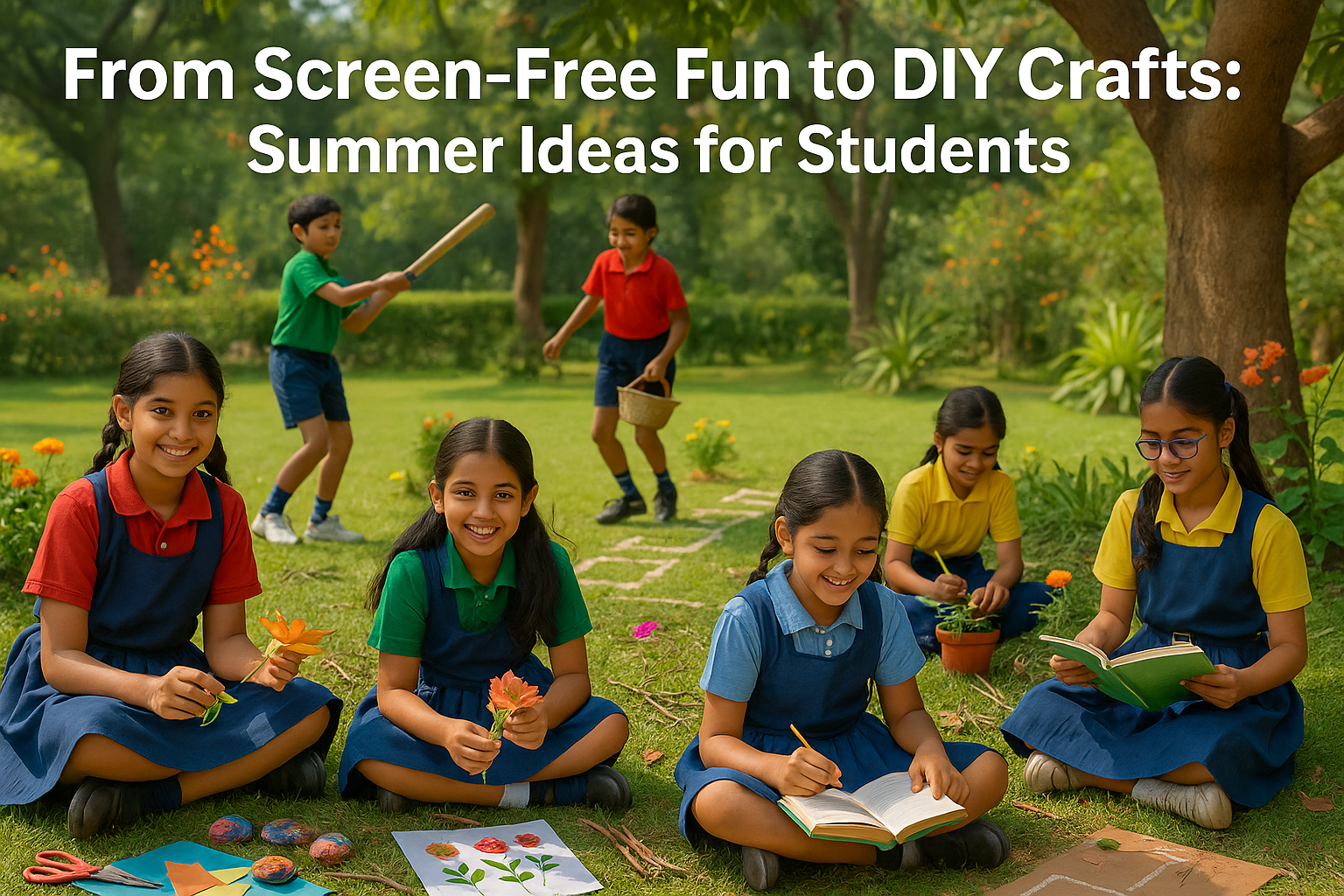Summer is a time for students to relax, recharge, and most importantly—explore their creativity beyond textbooks and screens. While digital entertainment is tempting, it’s important to balance screen time with enriching and fun activities that boost imagination, skill development, and overall well-being.
In this blog, we’ll share a bunch of exciting screen-free ideas—from indoor fun to outdoor adventures and DIY crafts—that not only keep students engaged but also help them learn in creative ways.
Why Screen-Free Activities Matter
Children today spend a large portion of their free time using smartphones, tablets, or watching TV. While some screen time is okay, too much of it can lead to:
- Poor sleep
- Reduced physical activity
- Lack of social interaction
- Decreased attention span
Engaging in hands-on activities can improve focus, creativity, and self-confidence. Let’s dive into some screen-free fun ideas that are perfect for summer!
1. Get Creative with DIY Crafts
Crafts are a great way to express creativity and use everyday materials around the house. Here are some easy and fun craft ideas:
Paper Crafts:
- Origami animals
- Handmade greeting cards
- Paper flowers and fans
Nature Crafts:
- Collect leaves, twigs, and flowers to make art
- Create a summer scrapbook using outdoor finds
- Paint on stones or shells
Recycled Crafts:
- Make pencil holders from cans and bottles
- Create robots using cardboard boxes
- Turn old T-shirts into tote bags
Crafting helps students improve their motor skills and gives them a sense of accomplishment when they create something from scratch.
2. Reading Adventures
Books are a wonderful way to travel to different worlds without leaving your home. Encourage kids to build a summer reading routine. Create a cozy corner with pillows and a reading light to make reading fun and inviting.
Here are some types of books that children can enjoy during summer:
- Adventure stories – Build imagination and curiosity.
- Comic books – Make reading enjoyable for reluctant readers.
- Puzzle books – Improve logic and thinking skills.
- Nature books – Teach about animals, trees, and the environment.
Reading helps improve vocabulary, focus, and storytelling skills—plus, it’s a lifelong habit that benefits students in every subject.
3. Try Gardening Together
Gardening is a peaceful and rewarding activity. It teaches kids about responsibility, patience, and the science of plant life. Even if you don’t have a garden, you can use pots on a balcony or windowsill.
Simple gardening ideas:
- Grow herbs like mint or coriander in small pots
- Plant sunflower seeds and track their growth
- Create a mini fairy garden in a tub or basket
Let students make a gardening journal to record what they planted and how it grew over time.
4. Fun with DIY Science Projects
Science doesn’t have to be complicated. Try simple, safe experiments at home using household items. It’s a fun way to understand basic science concepts while being creative.
Examples:
- Make a volcano with baking soda and vinegar
- Create a rainbow using water, mirror, and sunlight
- Build a mini water filter using sand, gravel, and cotton
These activities make science exciting and hands-on, sparking curiosity and deeper learning.
5. Cooking and Baking
Cooking is a life skill and a fun learning experience. It also helps students follow instructions, measure ingredients, and understand the science of mixing things together.
Simple recipes for children:
- Sandwich art (make shapes using veggies and bread)
- No-bake cookies or chocolate balls
- Homemade lemonade or fruit smoothies
Cooking gives kids a sense of independence and responsibility. Always supervise them while using sharp or hot items.
6. Outdoor Games and Activities
Summer is the perfect time for physical play. Outdoor games help improve health, coordination, and social skills.
Screen-free outdoor ideas:
- Treasure hunts or nature scavenger hunts
- Badminton, cricket, or hopscotch
- Kite flying or water balloon fights
Encourage students to spend time outdoors every day, even if it’s just in a nearby park or backyard.
7. Start a Summer Journal
Journaling helps kids reflect on their day and improve writing skills. A summer journal can include:
- Daily entries about what they did
- Drawings or sketches
- Stuck-in photos or stickers
- Lists of fun memories
Let them decorate their journals with colors, washi tape, or stickers to make it more exciting.
8. Build a Reading and Relaxation Fort
Students can turn a corner of their room into a “calm zone.” Use blankets, fairy lights, and cushions to make a cozy space where they can:
- Read
- Draw
- Meditate
- Listen to relaxing music or audiobooks (no screen needed!)
A quiet, peaceful space helps them take breaks and recharge their minds.
9. Learn Something New
Summer is a great time to pick up a new hobby or skill:
- Learn basic knitting or sewing
- Start journaling or creative writing
- Practice music or try learning a new instrument
- Explore a new language using flashcards and books
These hobbies help students discover their interests and talents while staying productive during holidays.
10. Community and Family Fun
Involve the whole family or neighbors in screen-free fun:
- Organize a craft competition or storytelling evening
- Plan a backyard picnic or themed dinner night
- Help students plan a mini play or puppet show
Doing activities together builds stronger family bonds and gives children a sense of belonging.
Final Thoughts
Summer doesn’t have to be about gadgets and screen time. With a little planning, students can have a summer full of learning, creativity, and joy—without even realizing it!
These screen-free activities encourage imagination, physical activity, life skills, and brain development. They’re fun, simple, and suitable for children of all ages.
So, this summer, put the screens away for a while and dive into some old-school fun. Whether it’s gardening, crafting, or reading under a tree—there’s a whole world waiting to be explored offline!
“Summer is the time to explore the world beyond screens and discover the joy of doing things with your own hands and heart.”




